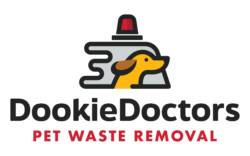Hey there, pet parents! Has anyone ever told you that dog waste is “just fertilizer” or “harmless?” Well, contrary to popular belief, this is not true. Today, the Dookie Doctors are here to bust some common myths about dog waste and provide accurate information about the importance of proper pet waste management.
Myth 1: “It’s just fertilizer.” 🌱
Or is it?
Fact: While dog poop contains organic matter, it’s not the same as your typical fertilizer. Since a dog’s diet consists mostly of meaty protein, its waste is much more acidic than that of a cow or horse(herbivores). For that reason, dog poop alone is not enough to fertilize your garden and can harm your plants instead. Dog poop can contain harmful bacteria, parasites, and other pathogens that can contaminate soil, and water, and pose health risks to humans and animals. Leaving pet waste unattended in public areas can contribute to pollution and harm the environment.
Myth 2: “It’s harmless.” 😇
Think again.
Fact: Pet waste can have harmful effects on the environment. If we leave pet waste in parks or on sidewalks, it can wash into storm drains; polluting rivers, lakes, and oceans. The bacteria and parasites in pet waste can cause water contamination, posing risks to human and animal health – especially for children and immunocompromised individuals. Finally, pet waste can be tracked into your house by children or pets. We all know that this is a no-go!
Myth 3: “It will decompose naturally.” ♻️
Well, sort of.
Fact: Pet waste takes a long time to decompose naturally. It can take several months to even years for pet waste to break down, depending on factors like weather conditions and location. During this time, it can continue to pollute the environment and pose risks to public health.
So, what can you do to be a responsible pet owner and help keep our communities clean and healthy? Here are some tips:
- Always pick up after your pet using biodegradable bags.
- Dispose of pet waste in designated pet waste bins or your own trash bin.
- Consider composting pet waste in a dedicated composting system in your backyard, following proper guidelines and regulations.
- Avoid flushing pet waste down the toilet, as it can contaminate water sources.
- Educate others about proper pet waste management and responsible pet ownership.
At Dookie Doctors Pet Waste Removal, we believe in responsible pet waste management practices that protect our environment and public health.
We hope you found this information helpful. For more information about our services and how we can keep your yard fresh and clear of pet waste on a regular basis, sign up at www.dookiedoctors.com or call 412-388-4178

